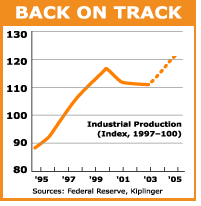

12/2004
HR • Shipping • The economy
HR
Firms that delete electronic mail willy-nilly run a big risk.
Any company that’s sued can count on e-mails being subpoenaed. Failure
to produce them can cost you plenty. In one recent case, Altria/Philip
Morris was fined $2.75 million for not complying.
You should have a policy that clarifies which business e-mails need to
be retained. And be sure not to forget about instant messaging, which is
rapidly replacing e-mail for many intraoffice communications.
Several vendors can help with e-mail and
IM archiving: Hummingbird, Open
Text, Plumtree, Veritas, and EMC’s Documentum, and Legato for e-mail.
FaceTime Communications, DYS Analytics, and IMlogic for IM.
New federal guidelines on ethics will
apply to all companies, public
or private, large or small. Nonprofits are covered as well.
Failure to comply could mean big penalties, even jail time.
But they’ll also help managers minimize their firms’ liability if one or more employees are guilty of criminal behavior on the job.
Companies that can show a good-faith effort at training their workers
and monitoring their performance will have a far easier time in court.
Seeking help with ethics training? Tools
are available online from PLI-Corpedia,
LRN, Midi, and WeComply for as low as $15 per employee. Employees are
encouraged to download Internet-based training sessions at their own
pace and document their progress for compliance records.
An unintended tax law change covering
dependents will be repealed by
Congress early next year. Under the new law, adult children can’t
be claimed as dependents if they earn more than $3,200 in 2005. Dependents
won’t qualify for tax-free coverage under the health plans of their
parents. And flexible spending account funds can’t be used for
dependent care. Unchanged, this could pose headaches for employers and
employees who have set aside tax-free dollars for 2005 expenses.
Congress will make the correction retroactive to Jan. 1, 2005.
Higher starting salaries for 2005 college
graduates are on tap. Grads
at both the bachelor’s and master’s levels can expect to
get offers from the mid- to high $30,000s, a range that hasn’t
been seen since 2001. But few employers will dangle signing bonuses to
woo good prospects.
Top accounting majors are among the
most heavily recruited. Others in
demand include engineering, management, and marketing grads.
Shipping
New developments will ease freight bottlenecks
in coming months, benefiting
both shippers and the businesses that depend on them. Shipments will
move more quickly and more effectively, reducing costs.
Ships that serve only U.S. ports will
be exempt from harbor fees starting
next year, making them more competitive with trucks and rail. An automaker
in the South, for example, could save money by sending cars from Charleston,
S.C., to Boston or Houston by ship rather than by truck.
Slightly wider cargo containers will boost the volume of cargo on trucks
and railcars by 10% without any adjustments to vehicle designs.
And better service by regional freight
railroads ... short lines ...
will be a prayer answered for many farmers and rural manufacturing execs.
Loads of upgrades are on tap for the nation’s 2,300 small railroads,
thanks to a new tax credit to offset infrastructure improvement costs.
 The economy
The economy
Weak hiring last month doesn’t signal an economic slump. A gain
of 112,000 jobs in November, about half of what was expected, reflects
a hiring pause to help businesses meet year-end profit targets. Companies
hope to offset a profit drag from fuel and raw materials costs.
GDP growth will decelerate early next
year, but only modestly, as consumers
grapple with high home heating and holiday shopping bills. Businesses
will take an investment break after splurging this quarter.
Meanwhile, we expect another interest
rate hike this month ... the fifth
since June. To justify the increase, the Federal Reserve will overlook
current mixed data and cite inflationary pressures ahead.
Factory production is poised to increase
4% or so in 2005. That spells
a slight downshifting from this year’s healthy 5.5% pace, the strongest
annual hike in the past seven years. High costs for energy and materials
plus slower growth overseas will account for next year’s falloff
in output.
Leading the manufacturing pack next year:
Factory machinery and military weapons
and gear. Also, transportation
equipment, medical supplies, and computers plus other information technology.
Other manufactured goods, including appliances, construction machinery,
and electrical equipment, will also gain next year, but at a slower
pace.
Only oil and gas drilling tools may
show a drop. Oil price volatility
makes drillers nervous. Many exploration companies will wait for some
stability before investing.
© 2004 The Kiplinger Washington Editors, Inc.
![]()
 |
||
| Kiplinger
is your source for timely insight into the economy and government.
Visit their Web site for more information.
|
||